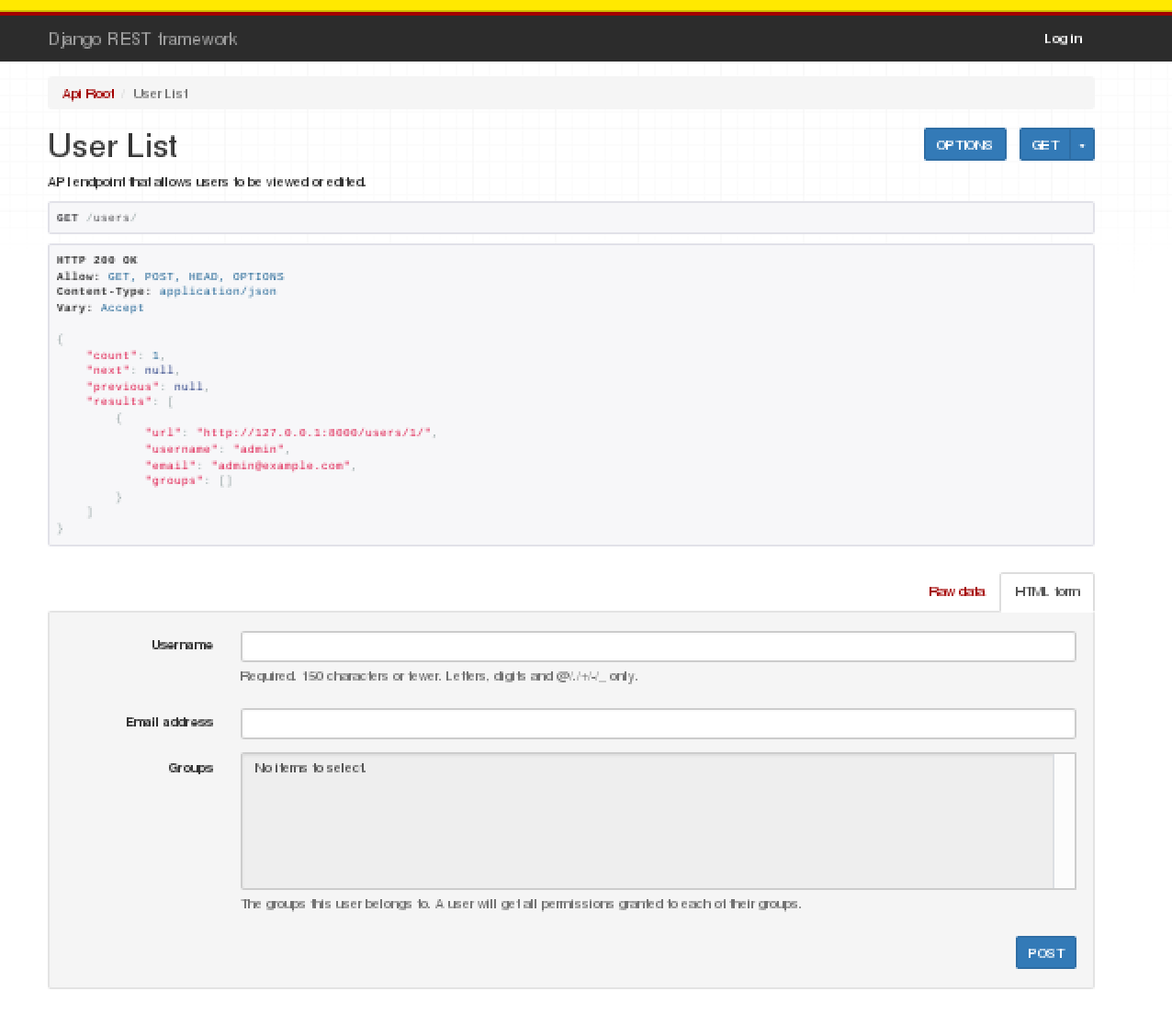Amazon Linux release 2 (Karoo)
前提条件
・Python3インストール済
・Python3の仮想環境作成済(python3 -m venv py37)
・Python3の仮想環境にpip installでDjangoとDjango REST Frameworkをインストール済
→ Django 2.2.1、Django REST Framework 3.9.3
・ユーザーのhomeディレクトリにworkというディレクトリ作成済
URL
Django REST Framework -Quickstart-
Djangoのプロジェクト作成
$ cd
$ cd work
$ django-admin startproject tutorial
$ cd tutorial
$ django-admin startapp quickstart
$ python manage.py migrate
# password:password123
$ python manage.py createsuperuser --email admin@example.com --username admin
Serializers
$ cd quickstart
$ vi serializers.py
tutorial/quickstart/serializers.py
from django.contrib.auth.models import User, Group
from rest_framework import serializers
class UserSerializer(serializers.HyperlinkedModelSerializer):
class Meta:
model = User
fields = ('url', 'username', 'email', 'groups')
class GroupSerializer(serializers.HyperlinkedModelSerializer):
class Meta:
model = Group
fields = ('url', 'name')
Views
$ vi views.py
tutorial/quickstart/views.py
from django.contrib.auth.models import User, Group
from rest_framework import viewsets
from tutorial.quickstart.serializers import UserSerializer, GroupSerializer
class UserViewSet(viewsets.ModelViewSet):
"""
API endpoint that allows users to be viewed or edited.
"""
queryset = User.objects.all().order_by('-date_joined')
serializer_class = UserSerializer
class GroupViewSet(viewsets.ModelViewSet):
"""
API endpoint that allows groups to be viewed or edited.
"""
queryset = Group.objects.all()
serializer_class = GroupSerializer
URLs
$ cd ../tutorial
$ vi urls.py
tutorial/urls.py
from django.urls import include, path
from rest_framework import routers
from tutorial.quickstart import views
router = routers.DefaultRouter()
router.register(r'users', views.UserViewSet)
router.register(r'groups', views.GroupViewSet)
# Wire up our API using automatic URL routing.
# Additionally, we include login URLs for the browsable API.
urlpatterns = [
path('', include(router.urls)),
path('api-auth/', include('rest_framework.urls', namespace='rest_framework'))
]
Pagination、Settings
$ vi settings.py
tutorial/settings.py
INSTALLED_APPS = (
...
'rest_framework',
)
REST_FRAMEWORK = {
'DEFAULT_PAGINATION_CLASS': 'rest_framework.pagination.PageNumberPagination',
'PAGE_SIZE': 10
}
Testing our API
$ cd ..
$ python manage.py runserver
Watching for file changes with StatReloader
Performing system checks...
Exception in thread django-main-thread:
Traceback (most recent call last):
File "/usr/lib64/python3.7/threading.py", line 917, in _bootstrap_inner
self.run()
File "/usr/lib64/python3.7/threading.py", line 865, in run
self._target(*self._args, **self._kwargs)
File "/home/sano/py37/lib64/python3.7/site-packages/django/utils/autoreload.py", line 54, in wrapper
fn(*args, **kwargs)
File "/home/sano/py37/lib64/python3.7/site-packages/django/core/management/commands/runserver.py", line 117, in inner_run
self.check(display_num_errors=True)
File "/home/sano/py37/lib64/python3.7/site-packages/django/core/management/base.py", line 390, in check
include_deployment_checks=include_deployment_checks,
File "/home/sano/py37/lib64/python3.7/site-packages/django/core/management/base.py", line 377, in _run_checks
return checks.run_checks(**kwargs)
File "/home/sano/py37/lib64/python3.7/site-packages/django/core/checks/registry.py", line 72, in run_checks
new_errors = check(app_configs=app_configs)
File "/home/sano/py37/lib64/python3.7/site-packages/django/core/checks/urls.py", line 40, in check_url_namespaces_unique
all_namespaces = _load_all_namespaces(resolver)
File "/home/sano/py37/lib64/python3.7/site-packages/django/core/checks/urls.py", line 57, in _load_all_namespaces
url_patterns = getattr(resolver, 'url_patterns', [])
File "/home/sano/py37/lib64/python3.7/site-packages/django/utils/functional.py", line 80, in __get__
res = instance.__dict__[self.name] = self.func(instance)
File "/home/sano/py37/lib64/python3.7/site-packages/django/urls/resolvers.py", line 579, in url_patterns
patterns = getattr(self.urlconf_module, "urlpatterns", self.urlconf_module)
File "/home/sano/py37/lib64/python3.7/site-packages/django/utils/functional.py", line 80, in __get__
res = instance.__dict__[self.name] = self.func(instance)
File "/home/sano/py37/lib64/python3.7/site-packages/django/urls/resolvers.py", line 572, in urlconf_module
return import_module(self.urlconf_name)
File "/usr/lib64/python3.7/importlib/__init__.py", line 127, in import_module
return _bootstrap._gcd_import(name[level:], package, level)
File "<frozen importlib._bootstrap>", line 1006, in _gcd_import
File "<frozen importlib._bootstrap>", line 983, in _find_and_load
File "<frozen importlib._bootstrap>", line 967, in _find_and_load_unlocked
File "<frozen importlib._bootstrap>", line 677, in _load_unlocked
File "<frozen importlib._bootstrap_external>", line 728, in exec_module
File "<frozen importlib._bootstrap>", line 219, in _call_with_frames_removed
File "/home/sano/work/tutorial/tutorial/urls.py", line 25, in <module>
from tutorial.quickstart import views
ModuleNotFoundError: No module named 'tutorial.quickstart'
エラーが出たので動くようにしてみた
「'quickstart',」を追加
tutorial/settings.py
INSTALLED_APPS = (
...
'quickstart',
)
一部修正
tutorial/urls.py
from django.contrib import admin
from django.conf.urls import url, include
from django.urls import include, path
# from rest_framework import routers
# from tutorial.quickstart import views
from quickstart.urls import router as quickstart_router
# router = routers.DefaultRouter()
# router.register(r'users', views.UserViewSet)
# router.register(r'groups', views.GroupViewSet)
# Wire up our API using automatic URL routing.
# Additionally, we include login URLs for the browsable API.
urlpatterns = [
path('admin/', admin.site.urls),
path('', include(quickstart_router.urls)),
path('api-auth/', include('rest_framework.urls', namespace='rest_framework'))
#path('', include(router.urls)),
#path('api-auth/', include('rest_framework.urls', namespace='rest_framework'))
]
ファイル追加
quickstart/urls.py
from rest_framework import routers
from .views import UserViewSet, GroupViewSet
router = routers.DefaultRouter()
router.register(r'users', UserViewSet)
router.register(r'groups', GroupViewSet)
一部修正
tutorial/quickstart/views.py
from django.contrib.auth.models import User, Group
from rest_framework import viewsets
# from tutorial.quickstart.serializers import UserSerializer, GroupSerializer
from .serializers import UserSerializer, GroupSerializer
class UserViewSet(viewsets.ModelViewSet):
"""
API endpoint that allows users to be viewed or edited.
"""
queryset = User.objects.all().order_by('-date_joined')
serializer_class = UserSerializer
class GroupViewSet(viewsets.ModelViewSet):
"""
API endpoint that allows groups to be viewed or edited.
"""
queryset = Group.objects.all()
serializer_class = GroupSerializer
動作確認
$ curl -H 'Accept: application/json; indent=4' -u admin:password123 http://127.0.0.1:8000/users/
{
"count": 1,
"next": null,
"previous": null,
"results": [
{
"url": "http://127.0.0.1:8000/users/1/",
"username": "admin",
"email": "admin@example.com",
"groups": []
}
]
ブラウザを起動して「 http://127.0.0.1:8000/users/ 」にアクセス
